BOARDWATCH: May 25 meeting of the Chicago Board of Eduction is business as usual despite the latest financial 'crisis'... Board expands expensive privatization of custodial and engineering work and many many expensive testing programs...
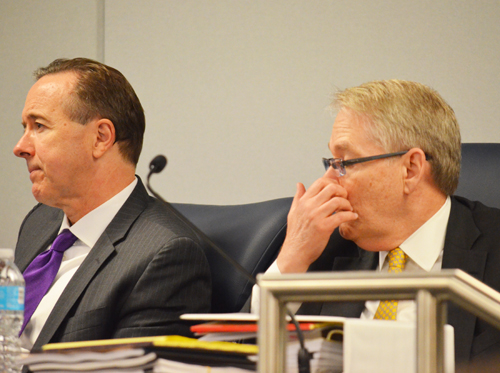 The experience that both "Chief Executive Officer" Forrest Claypool (above left) and chief lawyer Ronald Marmer (above right) brought to the Chicago public schools when they were appointed by Mayor Rahm Emanuel to their jobs in July 2015 was that they worked together at the Chicago Transit Authority. Above, Claypool and Marmer were photographed during the May 25, 2016 meeting of the Chicago Board of Education. Substance photo by George N. Schmidt.Sitting in the front of the small group of citizens allowed into the chambers of the Chicago Board of Education at the Board's May 25, 2016 meeting was a group of highly paid executives, almost none of whom was in power as late as one year ago. And despite the latest claim that the nation's third largest school system is facing another financial "crisis," an examination of the 150 page Agenda for the meeting (reported elsewhere at Substance) showed that it was business as usual -- meaning massive expensive privatization -- at CPS.
The experience that both "Chief Executive Officer" Forrest Claypool (above left) and chief lawyer Ronald Marmer (above right) brought to the Chicago public schools when they were appointed by Mayor Rahm Emanuel to their jobs in July 2015 was that they worked together at the Chicago Transit Authority. Above, Claypool and Marmer were photographed during the May 25, 2016 meeting of the Chicago Board of Education. Substance photo by George N. Schmidt.Sitting in the front of the small group of citizens allowed into the chambers of the Chicago Board of Education at the Board's May 25, 2016 meeting was a group of highly paid executives, almost none of whom was in power as late as one year ago. And despite the latest claim that the nation's third largest school system is facing another financial "crisis," an examination of the 150 page Agenda for the meeting (reported elsewhere at Substance) showed that it was business as usual -- meaning massive expensive privatization -- at CPS.
Budget issues and their repercussions dominated the regular monthly meeting of the Chicago Board of Education (BOE) held Wednesday, May 25, 2016, at Board headquarters on Madison Street east of Dearborn. The following Board members were present: Mark Furlong, Dominique Jordan Turner, Jaime Guzman, Board President Frank Clark, and Rev. Michael G. Garanzini, S. J. Also present were Chief Executive Officer (CEO) Forrest Claypool, Chief Education Officer Janice Jackson, and Ronald L. Marmer, Chief Counsel. Absent was Gail D. Ward.
During the "Honoring Excellence" portion of the meeting, chess students from Earle STEM Academy were honored. Also, an Amundsen High School junior, seniors, and an art teacher were honored for their production of a video related to the Board budget crisis.
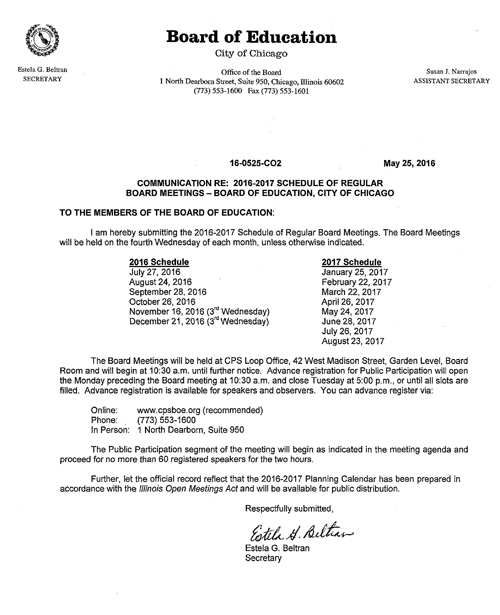 Despite the "charm offensive" being tried by Board President Frank Clark, it becomes clear based on the actual behavior of the Board when it's exercising its power that the message to the people of Chicago from its Board of Education is "Fuck You!" For example, despite the fact that the nation's third largest school system has facilities across the city with free parking and large spaces (including fancy auditoriums) for meetings after regular school hours, at its May 25, 2016 meeting, the Chicago Board of Education voted that for the next 15 months it will be meeting in the Loop and during what have been called "bankers' hours." Above, the schedule for the meetings of the Chicago Board of Education from July 2016 through August 2017 once again insists that meetings take place during the work day and at the Board's latest downtown corporate headquarters. During the business portion of the meeting, CEO Forrest Claypool told about the lead testing done at 32 pilot Chicago Public Schools. 31 of the 32 tested okay, but Tanner School did not. At Tanner, lead levels were slightly elevated in drinking fountains which were then disabled. The lead testing program is being expanded to older schools and to schools serving young children first before other schools are tested.
Despite the "charm offensive" being tried by Board President Frank Clark, it becomes clear based on the actual behavior of the Board when it's exercising its power that the message to the people of Chicago from its Board of Education is "Fuck You!" For example, despite the fact that the nation's third largest school system has facilities across the city with free parking and large spaces (including fancy auditoriums) for meetings after regular school hours, at its May 25, 2016 meeting, the Chicago Board of Education voted that for the next 15 months it will be meeting in the Loop and during what have been called "bankers' hours." Above, the schedule for the meetings of the Chicago Board of Education from July 2016 through August 2017 once again insists that meetings take place during the work day and at the Board's latest downtown corporate headquarters. During the business portion of the meeting, CEO Forrest Claypool told about the lead testing done at 32 pilot Chicago Public Schools. 31 of the 32 tested okay, but Tanner School did not. At Tanner, lead levels were slightly elevated in drinking fountains which were then disabled. The lead testing program is being expanded to older schools and to schools serving young children first before other schools are tested.
Next, CEO Claypool announced that Chicago along with other districts in the state will converge on Springfield on Thursday, May 26, to protest against discrimination against poor and minority students and regressive funding by Illinois. He said Chicago Public Schools (CPS) are at the "point of no return" and that severe budget cuts will affect classrooms. He mentioned that one week is left in the legislative session. He also said funding is needed regardless of Zip Code, country of origin, and race.
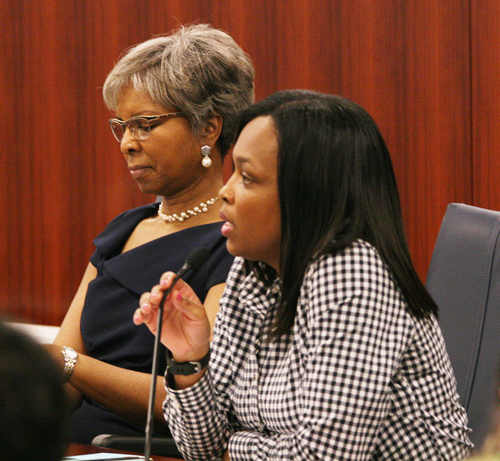 CPS "Chief Education Officer" Janice Jackson (above right) tried to explain to the Board why the Board was doing expensive so-called "standardized" testing of pre-K through second grade children. As even one Board member noted and speakers have long pointed out to various boards and CPS administrators, all of the research shows that such testing for Pre-K and early grades children is expensive, time consuming, and sometimes dangerous. Jackson basically joined with Board President Frank Clark in claiming that the central office had to have some "data" when children entered third grade, so CPS will continue to use the abusive and generally meaningless "early childhood" testing programs it was about to spend additional millions of dollars on. Substance photo by David Vance.After the Claypool report, Chief Education Officer Janice Jackson congratulated the current graduating seniors. In regard to student achievement and testing, she admitted that there has been an increase in standardized testing even though the Board wants to reduce it. She emphasized the importance of what she called "teacher-created assessments," even as the Board was preparing to approve the latest round of expensive purchasing of corporate testing packages. But the latest round of acronyms and expensive testing programs continued. NWEA-MAP? Jackson told the Board that the Northwest Evaluation Association (NWEA), which has been used for three years, will be given again next year. PARCC, which grows more controversial across the USA even as the Board meets? The Partnership for Assessment of Readiness for College and Careers (PARCC), which she referred to as a state assessment, will continue. She added that "length plus technology issues" will be addressed, but didn't say how, and no Board member even asked what she meant by that unusual phrase. Apparently, the PARCC is too long, and since computers are required, CPS has discovered it does not have the computer infrastructure -- hence "technology issues" -- in most schools for the PARCC to be done. And then there is the conflict between the ACT and the SAT. For years, CPS officials have claimed that "EPAS" tracked college and career readiness. "EPAS" is the acronym CPS and others have used to claim that the trajectory of testing using ACT Inc. tests (Explore, Plan and ACT) was an actual match for tracking students from eighth grade through high school to enable management to know whether the kids were "on track." But now, as to the "college readiness" tests, henceforth ACT testing will be ended. None of the top administrators at CPS was around when the EPAS versions of reality were discussed, and only one Board member (Hines) was there. Hence there were no questions about all those trackings as the next big test comes into being: the SAT. Jackson said that Chicago now moves to the SAT. Next year, she said, the SAT will be given to eleventh graders. She said that academic growth is a priority, but didn't explain how one eleventh grade test (the SAT) was going to replace all those other testings, although she did note that students would also be taking the PSAT ("preliminary" SAT). On another note, Jackson added that the guidelines for transgender students have been updated since the last Board meeting in order to provide what she called a "safe environment for transgender students". She noted that a big job for CPS was make these students feel safe, welcomed, and valued.
CPS "Chief Education Officer" Janice Jackson (above right) tried to explain to the Board why the Board was doing expensive so-called "standardized" testing of pre-K through second grade children. As even one Board member noted and speakers have long pointed out to various boards and CPS administrators, all of the research shows that such testing for Pre-K and early grades children is expensive, time consuming, and sometimes dangerous. Jackson basically joined with Board President Frank Clark in claiming that the central office had to have some "data" when children entered third grade, so CPS will continue to use the abusive and generally meaningless "early childhood" testing programs it was about to spend additional millions of dollars on. Substance photo by David Vance.After the Claypool report, Chief Education Officer Janice Jackson congratulated the current graduating seniors. In regard to student achievement and testing, she admitted that there has been an increase in standardized testing even though the Board wants to reduce it. She emphasized the importance of what she called "teacher-created assessments," even as the Board was preparing to approve the latest round of expensive purchasing of corporate testing packages. But the latest round of acronyms and expensive testing programs continued. NWEA-MAP? Jackson told the Board that the Northwest Evaluation Association (NWEA), which has been used for three years, will be given again next year. PARCC, which grows more controversial across the USA even as the Board meets? The Partnership for Assessment of Readiness for College and Careers (PARCC), which she referred to as a state assessment, will continue. She added that "length plus technology issues" will be addressed, but didn't say how, and no Board member even asked what she meant by that unusual phrase. Apparently, the PARCC is too long, and since computers are required, CPS has discovered it does not have the computer infrastructure -- hence "technology issues" -- in most schools for the PARCC to be done. And then there is the conflict between the ACT and the SAT. For years, CPS officials have claimed that "EPAS" tracked college and career readiness. "EPAS" is the acronym CPS and others have used to claim that the trajectory of testing using ACT Inc. tests (Explore, Plan and ACT) was an actual match for tracking students from eighth grade through high school to enable management to know whether the kids were "on track." But now, as to the "college readiness" tests, henceforth ACT testing will be ended. None of the top administrators at CPS was around when the EPAS versions of reality were discussed, and only one Board member (Hines) was there. Hence there were no questions about all those trackings as the next big test comes into being: the SAT. Jackson said that Chicago now moves to the SAT. Next year, she said, the SAT will be given to eleventh graders. She said that academic growth is a priority, but didn't explain how one eleventh grade test (the SAT) was going to replace all those other testings, although she did note that students would also be taking the PSAT ("preliminary" SAT). On another note, Jackson added that the guidelines for transgender students have been updated since the last Board meeting in order to provide what she called a "safe environment for transgender students". She noted that a big job for CPS was make these students feel safe, welcomed, and valued.
She continued, reporting to the Board that CPS has "more Gates Millennium Scholarships than the rest of the nation." She said CPS is the leading recipient of these scholarships for the last three years. Again, there were no specific questions, although later some on the Board noted that the Gates scholarships had gone to what they called "non selective enrollment schools" -- including Lincoln Park and Kenwood. Someone tried to say "Lindblom" (since Lindblom has Gates winners), but that was stopped.
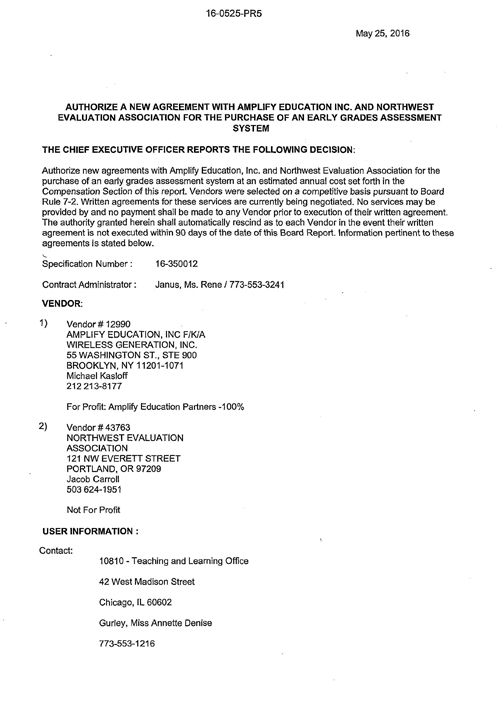 The Chicago Board of Education approved a two-year $3.5 million contract with NWEA and "Amplify" for a testing program for early childhood education, even though even Board members noted that testing children from pre-K through second grade cannot be done in an educationally sound way. Despite the long history of failure in this area, the Board Report (the first page of which is reproduced above) claimed that this privatization venture will provide CPS with early childhood testing which is "valid and reliable." After Jackson's report, Diego Giraldo, the latest "Chief Officer of Early Childhood Education," delivered a Power Point presentation on the "vision, mission, focus, programs, 2015-2016..." Praising Mayor Rahm Emanuel for leading on early childhood education several times during his presentation, he outlined what he called the highlights of the early childhood work in CPS. Giraldo explained the application process for Early Childhood Education slots. He said that starting September1, 2016, pre-school children will be enrolled at nine locations -- instead of directly at the neighborhood or chosen school. He added that registration can also be done online at apply.ChicagoEarlyLearning.org. Starting June 13th, calls for information can be placed to 312-229-1690. No one on the Board asked about the impact of the centralized enrollment system on possible applications.
The Chicago Board of Education approved a two-year $3.5 million contract with NWEA and "Amplify" for a testing program for early childhood education, even though even Board members noted that testing children from pre-K through second grade cannot be done in an educationally sound way. Despite the long history of failure in this area, the Board Report (the first page of which is reproduced above) claimed that this privatization venture will provide CPS with early childhood testing which is "valid and reliable." After Jackson's report, Diego Giraldo, the latest "Chief Officer of Early Childhood Education," delivered a Power Point presentation on the "vision, mission, focus, programs, 2015-2016..." Praising Mayor Rahm Emanuel for leading on early childhood education several times during his presentation, he outlined what he called the highlights of the early childhood work in CPS. Giraldo explained the application process for Early Childhood Education slots. He said that starting September1, 2016, pre-school children will be enrolled at nine locations -- instead of directly at the neighborhood or chosen school. He added that registration can also be done online at apply.ChicagoEarlyLearning.org. Starting June 13th, calls for information can be placed to 312-229-1690. No one on the Board asked about the impact of the centralized enrollment system on possible applications.
Board members did have questions at this point. Board members Mark Furlong and Dr. Mahalia Hines commented. Mark Furlong mentioned that the Early Childhood programs are not at capacity and wondered why. He described a visit to one non-CPS program, and asked why it was below "capacity". He didn't receive much of an answer until an alderwoman spoke a few minutes later. Dr. Mahalia Hines became outspoken. She advocated for full-day kindergarten, and noted that the expensive full-day programs were not really serving the families that need pre-kindergarten most. She was critical of the half-day programs, noting that many parents cannot always pick up their children who are in half-day programs.
Then the reports were over. Board President Frank Clark then made announcements regarding sign-up for the public participation for future meetings. Without noting that it was forced upon the Board by the Illinois Attorney General (which found that the Board has been in violation of the Open Meetings Act), Clark said that the routine now is that the Agenda will come out on the Monday before the Wednesday Board meeting and public participation sign-up will follow the publication of the Agenda. Previously, public participation sign-up began the Monday before the Monday before the meeting, a full week before the Agenda had been published and before people knew what would be covered on the Agenda. That, combined with the fact that the Board always capped the number of people who are being allowed to sign up to speak resulted in the "public participation" sign in being closed as much as a week before anyone could read the public Agenda.
As usual, Clark also said that those who use the website cpsboe.org with questions or comments will receive a response within 48 hours. He added that Board members get out into the community.
Board Secretary Estella Beltran then announced that the next Board meeting will be on Wednesday, June 22, 2016. Sign-up to participate will take place beginning Monday, June 20 at 10:30 and end on Tuesday, June 21, at 5 p.m. -- or when all 60 slots are filled, whichever comes first. Forty-three individuals were signed up to speak at this meeting and only thirty spoke, but the Board continues to set a maximum on the number of possible speakers. In fact, since the Board established its unusual maximum on the number of possible public speakers, there have never actually been 60 people who spoke. Some are forced to leave before they are called, while the Board forces those who are speaking on the "same topic" to "consolidate" and select a speaker or two, even if more than two speakers wish to comment. Before public participation began, there were two officials who were recognized to speak: The Alderman of the 10th Ward and the President of the Operating Engineers union.
Alderman (as she noted, Alderwoman) Susan Sadlowski Garza, 10th Ward, and Bill Iacullo, Local 143 of the Operating Engineers union, spoke.
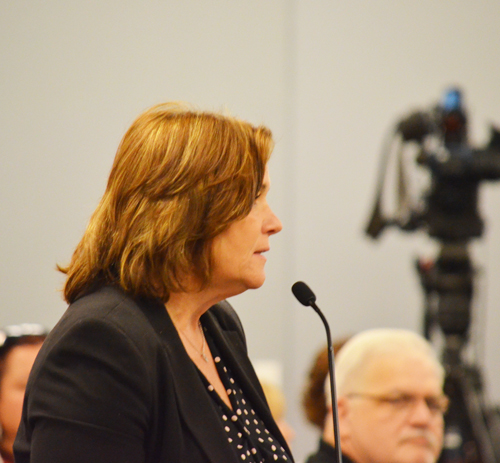 Sue Sadlowski Garza, alderwoman of Chicago's 10th Ward, spoke at length to the Board of Education's May 25, 2016 meeting. Substance photo by George N. Schmidt.Alderwoman Garza said she had previously been a counsellor in the school system. She mentioned a problem: Parents can no longer enroll their early childhood children at a local school. She said that this new application process leads to lower enrollment and that families needed to be able to sign up at their local school. She also talked about charges for preschool and remarked that "preschool for all means FREE preschool for all." She said that the new school opening in the 10th Ward will finally end the problems long faced by Gallistel Elementary School. People from her community have been protesting the overcrowding at Gallistel, she told the Board, for more than ten years. She noted that because of the massive overcrowding, Gallistel Elementary School had been located in three separate locations along South Ewing Ave. Children faced placement in the regular building and in the St. Francis De Sales School buildings to the north of the main building. After ten years of community protests, the new school is now slated to open.
Sue Sadlowski Garza, alderwoman of Chicago's 10th Ward, spoke at length to the Board of Education's May 25, 2016 meeting. Substance photo by George N. Schmidt.Alderwoman Garza said she had previously been a counsellor in the school system. She mentioned a problem: Parents can no longer enroll their early childhood children at a local school. She said that this new application process leads to lower enrollment and that families needed to be able to sign up at their local school. She also talked about charges for preschool and remarked that "preschool for all means FREE preschool for all." She said that the new school opening in the 10th Ward will finally end the problems long faced by Gallistel Elementary School. People from her community have been protesting the overcrowding at Gallistel, she told the Board, for more than ten years. She noted that because of the massive overcrowding, Gallistel Elementary School had been located in three separate locations along South Ewing Ave. Children faced placement in the regular building and in the St. Francis De Sales School buildings to the north of the main building. After ten years of community protests, the new school is now slated to open.
She thanked the Board members for finally seeing through the construction of the new school building, and noted that some staff including Janice Jackson had devoted a great deal of time meeting with the community to ensure that things went as smoothly as possible.
Garza noted one problem she asked the Board to avoid, however. She said that Gallistel and Jane Addams teachers are in the same community and that teachers should follow the students when student loss forces placement in another nearby building. She noted that applications for teachers for the new school now say that ESL/Bilingual teachers are preferred. She added that many of the current teachers are not ESL/Bilingual, nor are that many needed. She said that the community is adamant about the current teachers following the students to their new placement. She said that nineteen veteran teachers from Gallistel and Jane Addams should be able to stay in the neighborhood they have long served with the children they know. She also reminded the Board that the 10th Ward is the farthest south before Indiana and is often a forgotten part of Chicago.
When Sadlowski Garza was finished, Bill Iacullo, Operating Engineers Local 143, spoke against the further expansion of the privatization of engineers and custodial services. He said the same services have been done for decades by on-site engineers and custodial workers for less. He noted that no one provides the cost of privatization to taxpayers, instead facing Board members who simply make assertions. He asked, "Are these companies doing the work for free?" 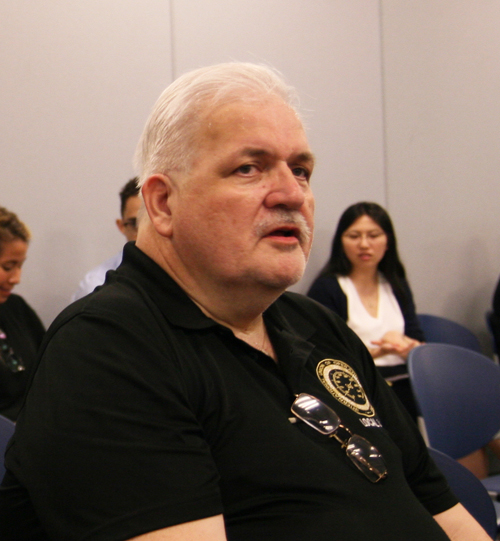 Bill Iacullo, President of the Operating Engineers Local 143, again challenged the Board's plans to privatize all engineering and custodial work in Chicago's public schools through contracts with the politically powerful and controversial corporations Aramark and SodexoMagic. Board President Frank Clark ignored the facts presented showing that the privatization contracts have resulted in filthy schools across the city and tried to focus the discussion on what Clark claims are the "savings" generated because of the privatization. Substance photo by David Vance. Iacullo noted that the schools are dirty since the privatization of custodial work began three years ago with the first Aramark contract, and asked why the privatization companies are being rewarded for their failure to maintain school cleanliness. He asserted there has been no true accountability since the initial privatization awards were made. He added that Aramark never bid for its contracts, and stated that the U.S. Attorney General needs to look at this. He virtually pleaded, saying "We're here to help you save money; we're not here to fight with you." He mentioned that he had served proudly as chief engineer for 20 years at Lincoln Park High School and that the engineers had been "partners" with the Board since 1902 [long before there was a Chicago Teachers Union].
Bill Iacullo, President of the Operating Engineers Local 143, again challenged the Board's plans to privatize all engineering and custodial work in Chicago's public schools through contracts with the politically powerful and controversial corporations Aramark and SodexoMagic. Board President Frank Clark ignored the facts presented showing that the privatization contracts have resulted in filthy schools across the city and tried to focus the discussion on what Clark claims are the "savings" generated because of the privatization. Substance photo by David Vance. Iacullo noted that the schools are dirty since the privatization of custodial work began three years ago with the first Aramark contract, and asked why the privatization companies are being rewarded for their failure to maintain school cleanliness. He asserted there has been no true accountability since the initial privatization awards were made. He added that Aramark never bid for its contracts, and stated that the U.S. Attorney General needs to look at this. He virtually pleaded, saying "We're here to help you save money; we're not here to fight with you." He mentioned that he had served proudly as chief engineer for 20 years at Lincoln Park High School and that the engineers had been "partners" with the Board since 1902 [long before there was a Chicago Teachers Union].
Board President Clark responded that the privatization "savings" would mean that "120 teaching positions" will be saved. He said that the prior administration was putting a cloud on what we're doing today and that was inaccurate. Iacullo, in turn, challenged the claims made by Clark and other CPS officials about the supposed "savings". He noted that in at least one report he had seen was filled with inaccuracies. [Substance notes that none of these supposed studies and surveys is currently public and subject to public review]. Iacullo said that CPS is actually running much the older buildings than the supposed "studies" claimed. These (privatized) buildings average 13 years, he said, according to the supposed "studies", while in fact the schools are in reality much older and some are more than 100 years old. "You are giving public money to private enterprises," at the expense of the children and clean schools, he insisted.
No other public officials, union officials, or elected officials spoke, and so the public participation finally began.
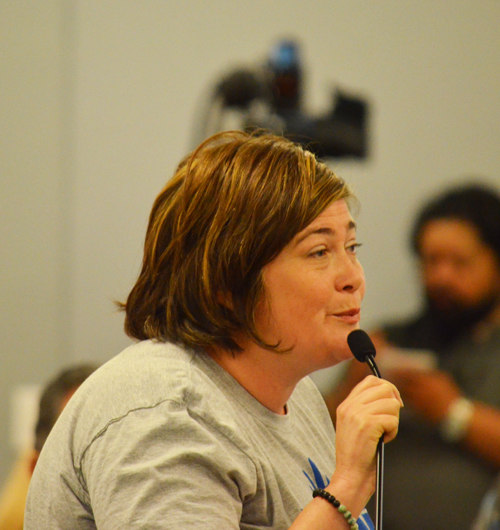 Wendy Katten of "Raise Your Hand" speaking at the May 25, 2016 meeting of the Chicago Board of Education. Substance photo by George N. Schmidt.The first public participant to speak was Marcus Ceniceros of KIPP Chicago charter schools. Ceniceros said that all students can and should go to college and repeated the oft-repeated claim that all graduates of his school had been "accepted" into colleges. He added that the formula for funding all Illinois students should be changed and that Chicago charter schools were being short changed.
Wendy Katten of "Raise Your Hand" speaking at the May 25, 2016 meeting of the Chicago Board of Education. Substance photo by George N. Schmidt.The first public participant to speak was Marcus Ceniceros of KIPP Chicago charter schools. Ceniceros said that all students can and should go to college and repeated the oft-repeated claim that all graduates of his school had been "accepted" into colleges. He added that the formula for funding all Illinois students should be changed and that Chicago charter schools were being short changed.
Wendy Katten, of Raise Your Hand, told the Board that she has a seventh grader at Burley School and so was a committed parent as well as an activist. She said that the "deficit" was supposedly $700 million when the Raise Your Hand group began in 2010, and now it's supposedly $1 billion. She didn't note that during the few short years since Raise Your Hand began in 2010, CPS has had six "Chief Executive Officers" -- Ron Huberman, Terry Mazany (interim), Jean Clacude Brizard, Barbara Byrd Bennett, Jesse Ruiz, and Forrest Claypool.
Standing in front of the latest generation of highly paid CPS administrators, Katten discussed the state of Chicago school finances. Katten remarked about the planned bus trips to Springfield on May 26 and said that the city "must be part of the solution." She added that this Springfield move is a bit of a charade -- we all know that. Noting local possibilities for revenue, she said "give us the Tax Increment Financing (TIF) money" and added some details about other local revenue sources.
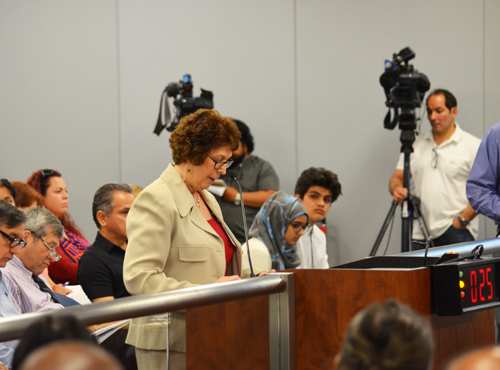 Denise Racky spoke to the Board about the professional problems and dangers to children being caused by the Board's ongoing privatization attacks on school nurses. Substance photo by George N. Schmidt.She asked, "Where are the creative solutions for our schools?" She told the Board that it was time to ask for the power to raise local property taxes beyond the PTEL cap so that Chicago could being catching up with its immediate neighbors. (Chicago presently has among the lowest local property taxes in the greater Chicago area; PTEL is the cap on how much CPS can raise local school property taxes...).
Denise Racky spoke to the Board about the professional problems and dangers to children being caused by the Board's ongoing privatization attacks on school nurses. Substance photo by George N. Schmidt.She asked, "Where are the creative solutions for our schools?" She told the Board that it was time to ask for the power to raise local property taxes beyond the PTEL cap so that Chicago could being catching up with its immediate neighbors. (Chicago presently has among the lowest local property taxes in the greater Chicago area; PTEL is the cap on how much CPS can raise local school property taxes...).
When she was being cut off and she said that she was almost finished, Board President Clark said, "Let her finish," so the security guard backed off as she added to the Board, "You didn't do it [i.e. create the current problems]. You're just the latest crop. That's why we need an elected school board."
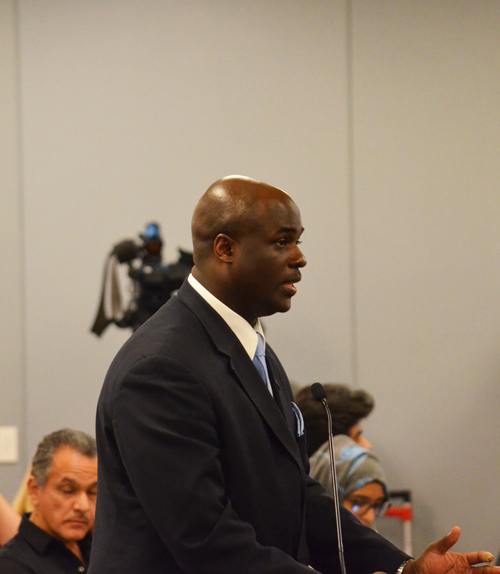 Reggie Newton, a parent from Decatur Classical School, reminded the Board of Education that it was not relieving overcrowding at the Northwest side school, while the Agenda included new schools for the Southwest side. Substance photo by George N. Schmidt.Next, Martin Ritter of the Chicago Teachers Union (CTU) said, "You are doing things all wrong." He said the Aramark schools are dirty and he asked why are we doing things that are proven not to work. He noted that a CTU survey showed that 90 percent say that the schools are dirtier. He mentioned the "20 for 20" slogan in which Chicagoans contribute 20 percent of the state income tax, and CPS students make up 20 percent of the state's enrollment, and in return CPS students receive 15% of the state's total funding, saying it was simplistic. Forrest Claypool interrupted Ritter with the words, "It's third grade match" to which Ritter did not respond.
Reggie Newton, a parent from Decatur Classical School, reminded the Board of Education that it was not relieving overcrowding at the Northwest side school, while the Agenda included new schools for the Southwest side. Substance photo by George N. Schmidt.Next, Martin Ritter of the Chicago Teachers Union (CTU) said, "You are doing things all wrong." He said the Aramark schools are dirty and he asked why are we doing things that are proven not to work. He noted that a CTU survey showed that 90 percent say that the schools are dirtier. He mentioned the "20 for 20" slogan in which Chicagoans contribute 20 percent of the state income tax, and CPS students make up 20 percent of the state's enrollment, and in return CPS students receive 15% of the state's total funding, saying it was simplistic. Forrest Claypool interrupted Ritter with the words, "It's third grade match" to which Ritter did not respond.
After Ritter spoke, Denise Racky talked about the privatization of school nurses and how this harms children. She said there is no quality control of care under privatization and that the privatization contracts meet minimum standards. She added that there is no accountability in the privatized system. She told the Board that this is a recipe for disaster. She added that our duty to children is to "Do No Harm."
After the Board was reminded about the nurses, Annette Rizzo, CTU Health and Benefits Coordinator, spoke of the deplorable unhealthy conditions in the schools since the Aramark privatization of custodial services began three years ago. Repeating what others have already reported, Rizzo told of the reduction in the number of custodians per school, the lack of cleaning adequate supplies, and the growing problems with filth. She noted that teachers are forced to provide toilet tissue for children, among other problems. Rizzo noted that teachers are using their own professional preparation periods to improve the situation by cleaning their own rooms -- even though that has long been against the union contract.
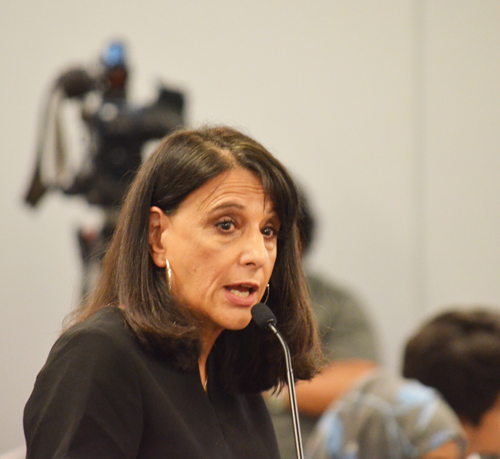 Chicago Teachers Union Health and Benefits Coordinators Annette Rizzo (above) told the May 25, 2016 meeting of the Chicago Board of Education that the privatization of custodial services has resulted in filthy conditions in the schools and has forced teachers to supply basic supplies like toilet paper to the children. Substance photo by George N. Schmidt.Rizzo gave an example of one school she had visited as a union official. She said that the little children had dumped their half-empty milk cartons into the waste baskets in the morning, and that the was baskets were filled with the soured milk in the afternoons. She talked of the smells and half-emptied milk cartons sitting overnight in garbage containers. She criticized the formulas that supposedly determine how many custodial workers are in a school, noting that the the number of students and the square footage formula supposed used determine how many custodians are assigned has been inaccurate. She said that this number has stayed the same while the number of custodians has dropped.
Chicago Teachers Union Health and Benefits Coordinators Annette Rizzo (above) told the May 25, 2016 meeting of the Chicago Board of Education that the privatization of custodial services has resulted in filthy conditions in the schools and has forced teachers to supply basic supplies like toilet paper to the children. Substance photo by George N. Schmidt.Rizzo gave an example of one school she had visited as a union official. She said that the little children had dumped their half-empty milk cartons into the waste baskets in the morning, and that the was baskets were filled with the soured milk in the afternoons. She talked of the smells and half-emptied milk cartons sitting overnight in garbage containers. She criticized the formulas that supposedly determine how many custodial workers are in a school, noting that the the number of students and the square footage formula supposed used determine how many custodians are assigned has been inaccurate. She said that this number has stayed the same while the number of custodians has dropped.
Following Rizzo, Reggie Newton of Decatur Classical School talked about the benefits of the school. He cited the chess club and other major programs at Decatur. He spoke of the great students and teachers who have to work with no gym, no cafeteria, classes in the hallway, and lunch in the hallway. The selective enrollment school goes to fifth grade. He said he is asking for creative solutions. The Board did not respond to his return to a Board meeting to ask for relief for Decatur, which is one of Chicago's "top" (i.e., highest scoring) elementary schools.
Charter school apologists came next. Brenda Core, who introduced herself at the principal of Rowe/Clark Math and Science Academy (a Noble charter school), talked about the budget cuts. She highlighted one student, Nathaniel Taylor, who went from Ds and Fs to higher grades. She said he was captain of the football team and class president and was now at the University of Illinois. Like all the other charter school speakers, she added that 100% of their students are accepted to college. No one mentioned that the "Clark" in "Rowe-Clark" was Frank Clark, who while he was CEO of Commonwealth Edison helped sponsor that "campus" of the Noble Network of Charter Schools.
After her, Freddie Ramos, came to the microphone, smiling at Frank Clark. He told Clark that he used to work at Com Ed (which Board President Frank Clark once headed), said he was a parent of a graduate of Lincoln Park High School and a sophomore at a Noble Network School. Board President Clark told him."Go to Springfield; that is the best way to help us."
Edwin Davila came next, again to praise charter schools. He said he grew up in a single parent home. He said his dad was in jail for many years. He added that he visits him and his dad will be out in four years. He added that Noble cared about him and now he attends Northern Illinois University and Noble Counselors still support him. Board President Clark commended him for his continued contact with his father.
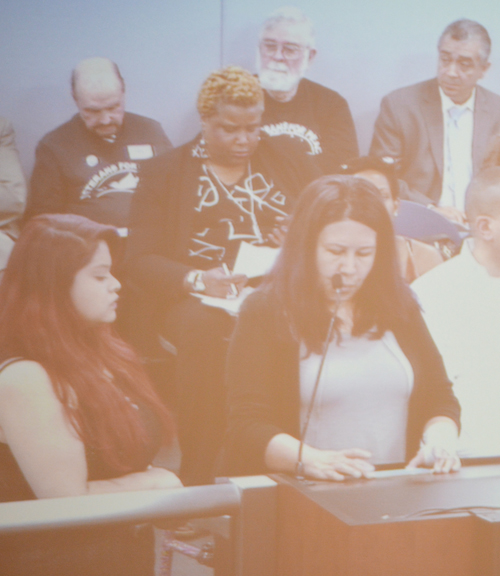 Nellie Cotton labored to get to the podium (she is using a walker) in order to remind the Board members of all the outstanding things that are being done in the face of the odds against Curie High School. Substance photo by George N. Schmidt.Nellie Cotton, a parent of a freshman and a sophomore at Curie Metro High School, begged for resources for the school. She criticized the two-tiered education system among the city's real public schools, then began a lengthy list of all the great things going on at Curie. She spoke of their new strong principal, one student who is heading to Harvard, and another student who was designated a Golden Apple Scholar. She named other student and sports achievements. She added that 96% of the seniors applied to three or more colleges this year.
Nellie Cotton labored to get to the podium (she is using a walker) in order to remind the Board members of all the outstanding things that are being done in the face of the odds against Curie High School. Substance photo by George N. Schmidt.Nellie Cotton, a parent of a freshman and a sophomore at Curie Metro High School, begged for resources for the school. She criticized the two-tiered education system among the city's real public schools, then began a lengthy list of all the great things going on at Curie. She spoke of their new strong principal, one student who is heading to Harvard, and another student who was designated a Golden Apple Scholar. She named other student and sports achievements. She added that 96% of the seniors applied to three or more colleges this year.
Stephanie Arias introduced herself as charter school manager at the Illinois Network of Charter Schools (INCS). Ignoring the great amount of money that charter schools receive from private sector millionaires (see "Rowe Clark" above), Arias asked for equal funding for all schools. She added, "Charter schools are public schools, too."
After the monthly INCS speaker, it was back to the overcrowding problems in Chicago's real public schools.
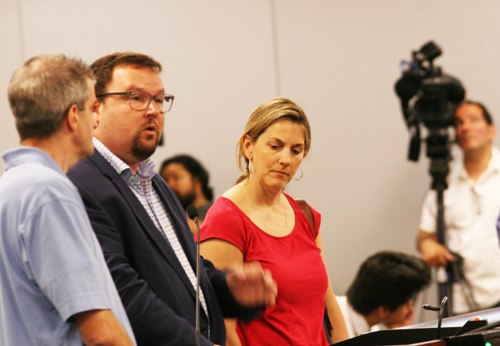 Parents and community leaders from Ebinger Elementary School on Chicago's Northwest Side continued to demand that the Board of Education build an annex to relieve the overcrowding at their school at the May 25, 2016 Board meeting. Above, Mark Wesoloskie speaks to the Board. Since they began coming to the Board meetings with their alderman months ago, the Ebinger leaders have been patient and polite to the Board members. Their patience was challenged when the Agenda for the May 25 Board meeting showed that CPS was planning on spending more than $100 million for new school construction on Chicago's South Side, while ignoring the equally pressing overcrowding problems on the North Side, including at Ebinger. Substance photo by David Vance. Mark Wesoloskie of Ebinger Elementary School spoke of the need for immediate action now for fair funding for facilities development. He said that Ebinger enrollment has continued to climb and he noted disbanding of present rooms to make room for additional enrollment. No one on the Board addressed the issue, which is being brought before the Board at virtually every meeting.
Parents and community leaders from Ebinger Elementary School on Chicago's Northwest Side continued to demand that the Board of Education build an annex to relieve the overcrowding at their school at the May 25, 2016 Board meeting. Above, Mark Wesoloskie speaks to the Board. Since they began coming to the Board meetings with their alderman months ago, the Ebinger leaders have been patient and polite to the Board members. Their patience was challenged when the Agenda for the May 25 Board meeting showed that CPS was planning on spending more than $100 million for new school construction on Chicago's South Side, while ignoring the equally pressing overcrowding problems on the North Side, including at Ebinger. Substance photo by David Vance. Mark Wesoloskie of Ebinger Elementary School spoke of the need for immediate action now for fair funding for facilities development. He said that Ebinger enrollment has continued to climb and he noted disbanding of present rooms to make room for additional enrollment. No one on the Board addressed the issue, which is being brought before the Board at virtually every meeting.
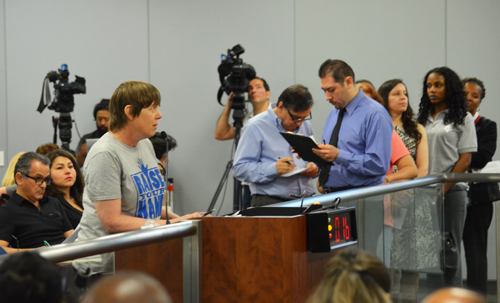 Joy Clendenning of Raise Your Hand speaking at the May 25, 2016 meeting of the Chicago Board of Education. Substance photo by George N. Schmidt.Joy Clendenning, of Kenwood Academy and Whitney Young High School, added her voice to those from the Raise Your Hand Coalition. She said all four of her children went to Ray Elementary School and continued to do well. She said she is on the Local School Council (LSC) and with Raise Your Hand (RYH). She said that we need our politicians to do what we voted them to do; we need them to join with us to demand that our public servants serve the public. She added that there are solutions in City Hall.
Joy Clendenning of Raise Your Hand speaking at the May 25, 2016 meeting of the Chicago Board of Education. Substance photo by George N. Schmidt.Joy Clendenning, of Kenwood Academy and Whitney Young High School, added her voice to those from the Raise Your Hand Coalition. She said all four of her children went to Ray Elementary School and continued to do well. She said she is on the Local School Council (LSC) and with Raise Your Hand (RYH). She said that we need our politicians to do what we voted them to do; we need them to join with us to demand that our public servants serve the public. She added that there are solutions in City Hall.
Maria Zavala spoke in Spanish for the United Neighborhood Organization (UNO) Charter School Network. In translation, she said that both her children are in UNO schools. She said she was concerned about budget cuts and the impact on classrooms. She added, "Charter schools receive less funds and CPS should do more to support charter schools."
Guillermina Veldez also has a child who is a student at UNO and a graduating senior at the University of Illinois-Chicago in the fall. She expressed concern about budget cuts and asked, "Why do charter schools receive less funds? Charter schools are public schools, too." She added that she will be in Springfield tomorrow.
Mary Towns and Tiffani Turner spoke of Chicago International Charter Schools (CICS) Longwood Academy on 95th Street. They mentioned that it takes parents for a school to work as well. She remarked that the school went from a Level 3 to a Level 2 and of the harm the budget cuts will cause.
Jose Hernandez, of Kelly High School, a dual-language school, said that the school takes part in many events, it has a new principal, and 100% of the students are applying for and being accepted at college. He added that the students sang the National Anthem at Cellular Field.
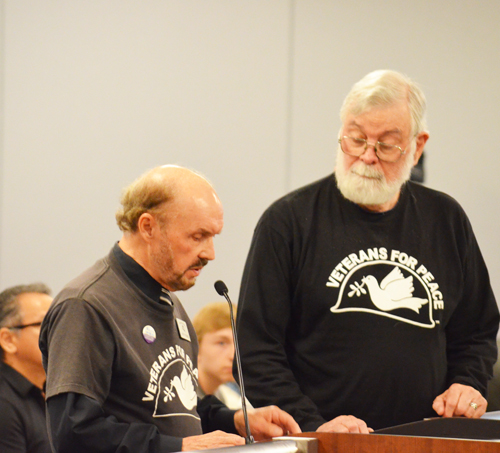 Arny Stieber of Veterans for Peace told the Board that he had served in the infantry during the American assault against the people of Vietnam and that his organization continued in its opposition to the militarization of Chicago's public schools. Substance photo by George N. Schmidt.Arny Stieber, introduced himself as "a retired CEO, a Viet Nam Veteran, and a member of Veterans for Peace." He spoke of the Memorial Day parade this weekend and how his organization, Veterans for Peace, is opposing CPS militarization. He said that there is more military training at CPS than at any other system in the nation. He gave a packet of information to Board members. He added that Veterans for Peace would like to speak at Reserve Officer Training Corps (ROTC) schools. He also said that Veterans for Peace would like to meet with the Board collectively.
Arny Stieber of Veterans for Peace told the Board that he had served in the infantry during the American assault against the people of Vietnam and that his organization continued in its opposition to the militarization of Chicago's public schools. Substance photo by George N. Schmidt.Arny Stieber, introduced himself as "a retired CEO, a Viet Nam Veteran, and a member of Veterans for Peace." He spoke of the Memorial Day parade this weekend and how his organization, Veterans for Peace, is opposing CPS militarization. He said that there is more military training at CPS than at any other system in the nation. He gave a packet of information to Board members. He added that Veterans for Peace would like to speak at Reserve Officer Training Corps (ROTC) schools. He also said that Veterans for Peace would like to meet with the Board collectively.
David Vance (who is also a Substance reporter and photographer) spoke of the need for the return of the lighted marquee in front of Bowen High School to Bowen High School. He mentioned that Barbara Byrd-Bennett (indicted former CEO) had the power to close fifty schools, and forced Bowen into a "co-sharing" agreement with the "Baker Campus" of Noble. He noted that that many of the co-sharing schools went to Noble, but that in the process the Baker name is now on the marquee in front of Bowen High School and Bowen, with a tradition of more than 100 years in that community, is not on it.
He mentioned that when the sign disappeared, some in the community thought that Bowen, a one-hundred-year-old school, had closed. He asked, "How do we get money?" He said Barbara Byrd-Bennett owes restitution and "a sliver of what she owes" could go for a marquee at Bowen. He added that what happened to Bowen should not happen to any high school.
Rosita Chatonda this time introduced herself as from the South Shore Community Action Committee (CAC), where she told the Board she is co-chair. She listed some issues she said she has been facing in the schools.
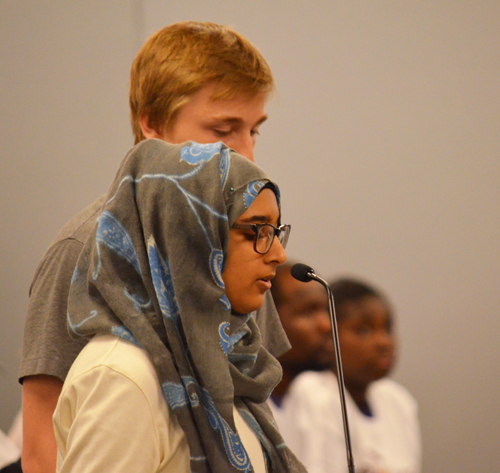 Sabah Hussain, a student at Lane Tech High School, challenged the Board members to do what is right and fully fund the city's real public schools. Substance photo by George N. Schmidt.Sabah Hussain, a Lane Tech High School student, said that it's time for CPS to right its wrongs and stop the systematic starvation of public education. She said that we cannot use Springfield to cover up for your lack of actions. She added that we need more sustainable sources of income. She spoke of TIF allocations and said, "Do your job and fund our education."
Sabah Hussain, a student at Lane Tech High School, challenged the Board members to do what is right and fully fund the city's real public schools. Substance photo by George N. Schmidt.Sabah Hussain, a Lane Tech High School student, said that it's time for CPS to right its wrongs and stop the systematic starvation of public education. She said that we cannot use Springfield to cover up for your lack of actions. She added that we need more sustainable sources of income. She spoke of TIF allocations and said, "Do your job and fund our education."
Juan Garcia, of Lane Tech, also expressed concern for the serious cuts in the funding of CPS schools citywide.
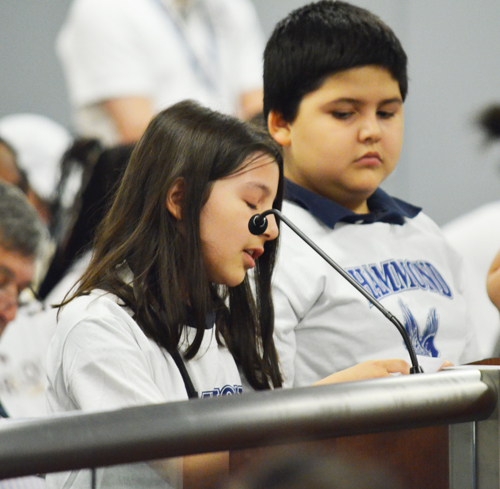 Hammond Elementary students Valerie Magallon (left) and Omar Chavez (right) told the Board that the Columbus Day holiday should be changed to Native American Day. After they had left the podium, Board President Frank Clark remarked that the holiday was a National Holiday, as if that prevented CPS from asking that the imperialist genocidal holiday be changed. Substance photo by George N. Schmidt. Two elementary children, Valarie Magallon and Omar Chavez, students at Hammond Elementary School, accompanied by their teacher, Jim Vail, spoke about the Columbus Day Holiday. Valerie said she wanted the name Columbus Day changed to Native American Day. She noted that Christopher Columbus was not a hero and that he killed for gold. She mentioned various harmful acts he committed. She asked for a petition requesting the name change to be signed and indicated that parents had signed the petition.
Hammond Elementary students Valerie Magallon (left) and Omar Chavez (right) told the Board that the Columbus Day holiday should be changed to Native American Day. After they had left the podium, Board President Frank Clark remarked that the holiday was a National Holiday, as if that prevented CPS from asking that the imperialist genocidal holiday be changed. Substance photo by George N. Schmidt. Two elementary children, Valarie Magallon and Omar Chavez, students at Hammond Elementary School, accompanied by their teacher, Jim Vail, spoke about the Columbus Day Holiday. Valerie said she wanted the name Columbus Day changed to Native American Day. She noted that Christopher Columbus was not a hero and that he killed for gold. She mentioned various harmful acts he committed. She asked for a petition requesting the name change to be signed and indicated that parents had signed the petition.
Omar Chavez added that he and his fellow students had researched Columbus. He added that Columbus did not get any consequences for killing all those people and he also took slaves.
Dr. Carik Collins-Ayanlaja introduced herself as "Superintendent for Prologue Schools." She expressed concern about contract schools. She said that we don't want left-behind schools closed. She asked the Board to please consider our program for restructuring. She asked the Board to not hastily decide to close those schools.
Anna Jones, of Mollison, a Bronzeville parent and a mother of four, spoke of inhumane conditions and overcrowding. She said that education is the key to success, but my children's success has been compromised. She added that we are the richest country in the world and that the cuts shouldn't happen. She concluded, "Our children are dying in the streets."
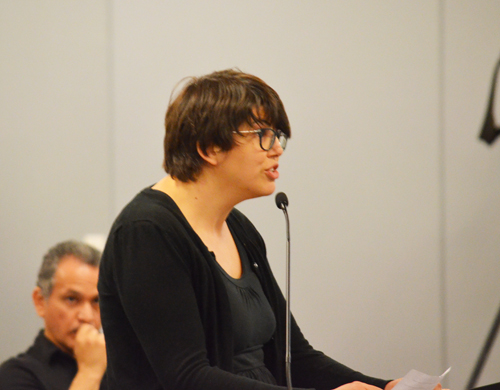 After presenting the Board with facts undermining the Board's retention policy and its policy of utilizing "standardized" tests on early childhood children, Cassie Creswell, of More than a Score, found herself in a dialogue with Board member Mark Furlong. Substance photo by George N. Schmidt.Cassandra Creswell, of More Than a Score, said the promotion policy was unchanged and that retention is incredibly damaging and expensive. She remarked that retention should be done away with all together and that we need supports instead. She added that standardized testing was harmful.
After presenting the Board with facts undermining the Board's retention policy and its policy of utilizing "standardized" tests on early childhood children, Cassie Creswell, of More than a Score, found herself in a dialogue with Board member Mark Furlong. Substance photo by George N. Schmidt.Cassandra Creswell, of More Than a Score, said the promotion policy was unchanged and that retention is incredibly damaging and expensive. She remarked that retention should be done away with all together and that we need supports instead. She added that standardized testing was harmful.
Board member Mark Furlong said, "You are passionate about testing. Is there any amount of testing that you feel would be okay?"
Cassandra Creswell responded that testing of little kids is not helpful and added that no such testing takes place in Lab schools. She added that eight or twelve tests is a lot and that one-on-one testing leaves 25 to 30 kids doing nothing. Board member Mark Furlong then asked that "Chief Education Officer" Janice Jackson to present the Board's views. Jackson said that "we need to track student progress." She said that this had to be known by third grade, implying that the only way to know about "student progress" was to use invalid "standardized" testing that we not age appropriate. Cassandra Creswell remarked that three years ago, CPS said testing was reduced significantly but that this was not so. She once again asked that testing of small children be stopped. She said that the number of tests was really undercounted. She added that grades four to twelve in Lab Schools were tested four times and if testing were so necessary, rich parents would be demanding tests.
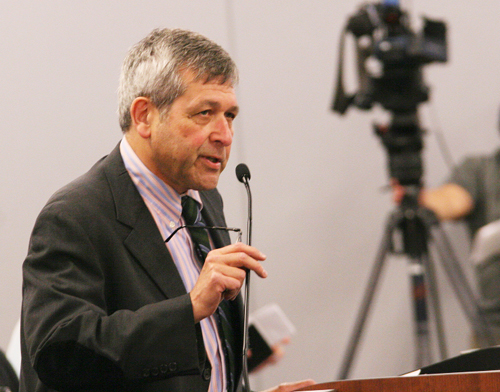 Jeff Berkowitz told the meeting that he had gotten the runaround from Forrest Claypool. Substance photo by David Vance.Next, Jeffrey Berkowitz, of "Public Affairs," a TV show, on Channel 21 on Monday at 8:30 and midnight, said "children are dying because they are not learning to read." He noted that the CPS six billion dollar budget means "$15 thousand per kid per year." He added that, as a Board, you should be making plans. He concluded that Forrest Claypool had not been able to make a scheduled interview on "Public Affairs."
Jeff Berkowitz told the meeting that he had gotten the runaround from Forrest Claypool. Substance photo by David Vance.Next, Jeffrey Berkowitz, of "Public Affairs," a TV show, on Channel 21 on Monday at 8:30 and midnight, said "children are dying because they are not learning to read." He noted that the CPS six billion dollar budget means "$15 thousand per kid per year." He added that, as a Board, you should be making plans. He concluded that Forrest Claypool had not been able to make a scheduled interview on "Public Affairs."
George Schmidt, editor of Substance News, a 42 year-old newspaper, now only available on the web [at www.substancenews.net], said that he would be celebrating his 70th birthday soon and did not believe he would still be doing this still. Noting that Cassandra Cresswell did a better job explaining the problems with the expensive childhood testing plans, Schmidt said he'd talk about other issues, equally important.
He spoke of the privatization of services through Aramark and Sodexo. He said the $340 million had gone to privatization services; two Board reports on the Agenda showed that Aramark will receive $260 million and SodexMagic $80 million. He said the Board was rubber-stamping privatization schemes and abusing our children. He called the Board hypocrites and spoke of the continuation of the hypocrisy that we've denounced.
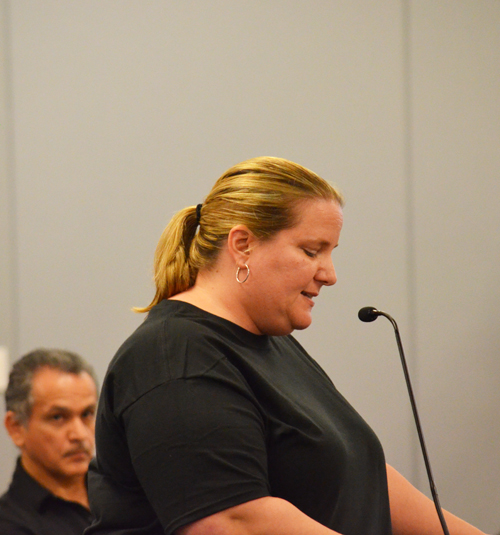 Janet Meegan of Linne Elementary School itemized the cuts that had already screwed the school and noted that if the additional cuts threatened by Forrest Claypool were implemented class sizes at the school would go up to 44. She also told the Board that she had been active in Springfield (three times this school year), since every speaker was asked to join Claypool in lobbying the General Assembly the day after the Board meeting. Substance photo by George N. Schmidt. Janet Meegan, of Carl Von Linne School, praised the fantastic staff at the school and said that despite the cuts, funds were being raised to provide for needs, but the school has lost so much. She listed various programs that have already been cut because of the Board's austerity budgets. She noted that the school has been at Level 1 for three years and that many programs are now gone. She mentioned an over one million dollar cut at Linne. She said that the cuts that Forrest Claypool announced would mean a loss of eight more teachers at Linne and an increase to 44 students per class because of the necessary increases in class size. Anticipating the Board's response to every speaker who talked against further cuts, she added that she has been to Springfield "three times this year" and that she has done her part. She added that more can be done by the Board. She told the Board to do the right thing for the children.
Janet Meegan of Linne Elementary School itemized the cuts that had already screwed the school and noted that if the additional cuts threatened by Forrest Claypool were implemented class sizes at the school would go up to 44. She also told the Board that she had been active in Springfield (three times this school year), since every speaker was asked to join Claypool in lobbying the General Assembly the day after the Board meeting. Substance photo by George N. Schmidt. Janet Meegan, of Carl Von Linne School, praised the fantastic staff at the school and said that despite the cuts, funds were being raised to provide for needs, but the school has lost so much. She listed various programs that have already been cut because of the Board's austerity budgets. She noted that the school has been at Level 1 for three years and that many programs are now gone. She mentioned an over one million dollar cut at Linne. She said that the cuts that Forrest Claypool announced would mean a loss of eight more teachers at Linne and an increase to 44 students per class because of the necessary increases in class size. Anticipating the Board's response to every speaker who talked against further cuts, she added that she has been to Springfield "three times this year" and that she has done her part. She added that more can be done by the Board. She told the Board to do the right thing for the children.
Board comments were made regarding the Columbus Day renaming, lead testing, and CPS buses to Springfield. Frank Clark noted that the Columbus Day holiday is a national holiday, implying that there is nothing the Chicago Board of Education can do about that. Mahalia Hines stated forcefully that "no research supports testing at that (early childhood) age level." She added that no research will show that that kind of testing is effective for little kids. She was cheered by some of those left in the audience, but when the Board came out of closed session later, the vote was in favor of the expensive proposal to do more early childhood "standardized" testing.
Public participation then concluded and the Board went into closed session.
In order to see how much is left out in the corporate media, below are some of the major reports from the May 25 Board meeting...
CHICAGO TRIBUNE....
CPS expands maintenance deal... Union objects as SodexoMAGIC gets 30 more schools...By Juan Perez Jr., Chicago Tribune
Photo: Protesters walk Wednesday from the Thompson Center to City Hall, where they spoke out against school cuts. (Nancy Stone/Chicago Tribune )
The head of the labor union representing Chicago Public Schools' building engineers called plans to privatize his group's work a “money pit scheme” as the district's board approved an expansion of a privately managed maintenance program.
The unanimous vote by the Chicago Board of Education doubles the size of an upkeep program managed under contract of up to $80 million won by SodexoMAGIC, a company partly controlled by former NBA superstar and Mayor Rahm Emanuel supporter Earvin “Magic” Johnson.
The district, citing its bleak financial condition, privatized many building maintenance duties in 2014 but quickly started receiving complaints about dirty schools.
“These are the same companies with complaints against them for dirty, filthy schools,” William Iacullo, president of the International Union of Operating Engineers Local 143, told the school board Wednesday. “But you guys are going to reward them with an expansion.”
Iacullo also contended the moves would eventually cost CPS more money, prompting an exchange with board President Frank Clark.
“I know you don't agree with this, and I respect the fact that you don't agree,” Clark told Iacullo. “But year over year, this move, this change, will save the equivalent of 120 teaching positions. It is a huge cost savings.”
CPS has requested proposals to standardize the custodial program — known as “integrated facilities management” — at all schools by the 2017-18 school year. That would affect hundreds of building engineers covered by a district labor contract that expires next month.
“The expansion won't affect anybody, but when the (request for proposals) goes through, all of us eventually would be hired by the private vendor — that's what they're claiming — if we meet their qualifications, and we still don't know what that is,” Iacullo told reporters.
Iacullo said the union offered terms for a five-year contract but CPS rejected the terms.
Under the integrated facilities management model, SodexoMAGIC handled custodial and engineering services, snow removal, landscaping and pest control at 33 district schools. The expansion approved Wednesday adds 30 schools to the company's purview, CPS said. SodexoMAGIC also oversees CPS' entire school facilities management system.
CPS said 18 schools managed by Aramark will be put into a maintenance program similar to that run by SodexoMAGIC.
CPS has so far paid Johnson's company more than $37 million since the district's 2014 budget year, according to school records. The Aramark division responsible for school maintenance has received about $167 million.
The district said its expenses to Sodexo would increase because of its expanded responsibilities but remain within the $80 million of spending already approved by the school system.
Also on Wednesday, the school board approved the purchase of a 1.24-acre site that will eventually be home to a new elementary school in the South Loop neighborhood.
The district said an estimated $8.7 million needed to buy and demolish the former U.S. Postal Service site at 16th and Dearborn streets will be paid with tax increment financing funds.
CATALYST GAVE MORE DETAIL ABOUT THE PRIVATIZATION OF ENGINEERING WORK...


By: Jim Vail
Great report
Great report on board meeting.
Note on Columbus name change - several cities have changed the name already. Like anything, you need to push hard to rewrite our racist celebrations.
Thanks again Substance!
Jim Vail, Hammond